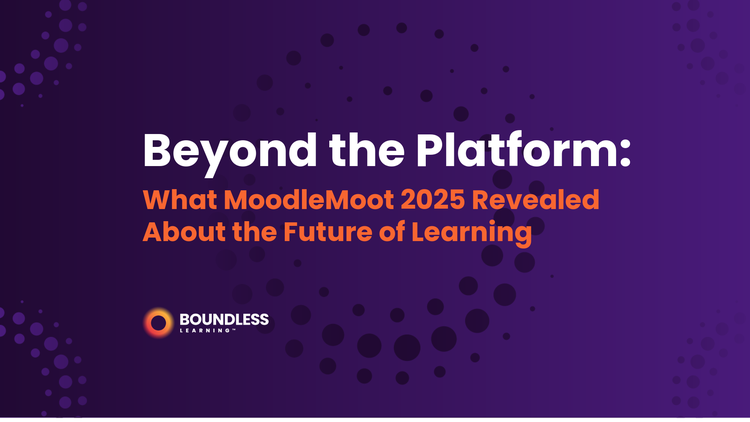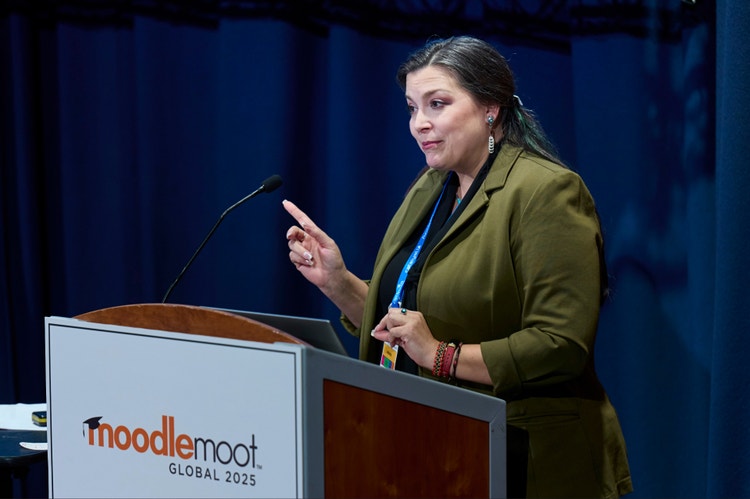Beyond the Platform:
What MoodleMoot 2025 Revealed About the Future of Learning

By Andrea Marcinkus, Ph.D., Senior Director of Research & Insights
In mid-September, I attended MoodleMoot Global 2025 in Edinburgh, U.K., an event that felt both familiar and refreshingly new. While past Moots often centered on technical implementation, this year widened its lens around three themes: actionable insights on AI, digital transformation, and the future of learning. While there was still emphasis on feature and plug-in walkthroughs, there were more sessions on how institutions, partners, and the broader community are translating ideas around the LMS platform into impact.
The atmosphere reflected that shift. Educators, technologists, and corporate learning professionals from more than 60 countries came together to explore the intersection of pedagogy and innovation. Discussions around AI ethics, learner engagement, and the evolving role of open-source learning systems were an integral part of the conversations. What stood out most was the willingness to exchange lessons learned and examine how digital transformation can be both practical and more human.
This spirit of openness and innovation is set to continue as the event evolves from MoodleMoot Global to MIX (Moodle Ideas Exchange), a conference designed to foster idea-sharing and cross-sector collaboration. The change reflects the sector’s broader shift — from isolated tools toward connected, human-centred learning experiences.
Highlights from the sessions
I attended the event with my colleague Kelly Cocks, Senior Director of Product Solutions and Success at Boundless Learning. We focused our time on sessions that combined design, data, and operations; how decisions at the architecture level translate into better learner journeys.
The sessions we found most valuable spoke directly to the intersection of design, data, and partnership.
- “10 Years of Insight: Real Strategies from Higher Ed and Corporate Leaders to Boost Learner Progress and Retention” by Becky Keith (IntelliBoard) offered pragmatic ways to turn reporting into decision-making—role-based dashboards, early-risk signals, and ways to communicate results to leadership that prompt action.
- “What Is Digital Capital and Why Should You Care?” by Liz Starbuck Greer (Moodle HQ) provided a compelling framework for understanding how learner outcomes hinge not only on access but also on the social, cultural, and economic factors that shape how people use technology and how intentional design can reduce inequality.
- “Moodle Workplace: Where All the Learning Happens” by Emilio Lozano (Moodle HQ) articulated the platform’s direction toward balancing prescribed and self-directed learning, introducing catalogue-driven discovery, and moving toward skills-based, learner-centered pathways.
- “Microlearning Strategies That Actually Work” by Sam Suresh (ModernLMS) shared practical models for breaking content into purposeful units, reinforcing learning with low-stakes assessment, and sustaining attention through thoughtful pacing.
Together, these sessions pushed the conversation forward — showcasing Moodle and related tools, while highlighting how people, process, and platforms must come together to create more coherent learner experiences.
Presenting: From Systems to Ecosystem

Photo taken at MoodleMoot Global 2025.
Against that backdrop, I presented From Systems to Ecosystem: Building a Connected Learning Future. The session explored how institutions can move from managing platforms to coordinating an ecosystem: aligning discovery, enrollment, learning, support, and progression so that the experience feels continuous for learners and workable for teams.
The session began with insights from Boundless Learning’s 2025 Higher Education Product and Technology Survey, which gathered input from more than 180 institutional leaders across the U.S., Canada, U.K., and Ireland. The findings revealed a striking gap between adoption and integration. While nearly every institution has invested in multiple digital systems, only 47% report that those systems “work well together,” and even fewer feel they are delivering a cohesive learner experience. The most common pain points cited were fragmented data, unclear learner pathways, and difficulty connecting enrollment, course activity, and outcomes data in one view.
These insights framed a central question: How can institutions turn technology investment into connected, human-centered learning? That question guided the introduction of the Boundless Learning Experience Suite (LXS): a platform built to bring together discovery, enrollment, learning, and engagement within one unified ecosystem. During the session, I shared examples of how the LXS directly addresses the integration and visibility challenges institutions identified in the survey:
- Discovery and enrollment: Institutions often lose prospective learners early in the journey, because their offerings live across multiple sites and systems. The LXS consolidates this into a single catalogue, allowing learners to browse, compare, and enroll seamlessly across programs — credit, noncredit, and professional.
- Learning continuity: For many learners, momentum is lost when they move between LMSs or platforms. The LXS provides a unified learner dashboard that integrates course activity, deadlines, and progress tracking across systems, keeping learners engaged and institutions informed.
- Data visibility: Many universities struggle to connect data across enrollment, engagement, and outcomes. The LXS integrates data from LMS, CRM, and eCommerce systems into one analytics layer, enabling more responsive support and better reporting for leadership.
Together, these capabilities reflect a shift from managing systems to orchestrating an ecosystem where technology serves a cohesive, data-informed learner experience.
I concluded with three design principles that underpin this ecosystem approach:
- Integration as the baseline. Systems must work together, not just coexist.
- Ethical, intelligent data use. Data should empower learners and guide institutional strategy.
- Flexible, modular pathways. Programs should adapt to how learners actually navigate education and work.
These principles, and the LXS itself, represent Boundless Learning’s broader commitment to helping institutions achieve digital maturity through connected design. At MoodleMoot, these ideas resonated with attendees navigating similar challenges: how to align open-source flexibility with enterprise-scale strategy, how to turn analytics into action, and how to ensure that as technology evolves, the learner remains at the center.
Where Moodle, and the sector, are heading
The transition from MoodleMoot to MIX signals an important shift: the platform is part of a broader movement toward open, interoperable, and learner-centered learning. Maturity in digital learning is no longer measured solely by the sophistication of a single system, but by the strength and coherence of the ecosystem around it; how pedagogy, data, and operations come together to create meaningful progress for learners.
For those of us working at this intersection, the implications are practical. Companies like Boundless Learning are not simply delivering services; we’re collaborating with institutions to help them advance along the digital-maturity curve, combining strategy, design, and technology to achieve sustainable, evidence-based results. This evolution demands new forms of partnership built on transparency, co-design, and shared outcomes rather than transactions.
Looking ahead
Leaving Edinburgh, my takeaway was straightforward: the future of learning will be defined by the quality of our connections — between educators, platforms, learners, and ideas. As Moodle evolves into MIX, that spirit of exchange will become even more central, inviting participants to contribute ideas that shape the next generation of open learning ecosystems.
For Boundless Learning, these conversations reaffirm our own direction: from systems integration to ecosystem orchestration; from one-off projects to sustained partnerships that prioritize coherence, adaptability, and measurable learner success. The opportunity and responsibility now lies in continuing to collaborate across communities, products, and philosophies to make digital transformation both human and lasting.
MoodleMoot Global 2025 made it clear: the next chapter of online learning will not be written by systems alone; it will be co-authored by the ecosystems we build together.
About the Author: Andrea Kolasinski Marcinkus, Ph.D., is the Senior Director of Research & Insights at Boundless Learning, where she leads a global team delivering actionable insights that inform academic strategy, product innovation, and institutional growth. Partnering with universities, associations, and corporate organizations, her team analyzes market trends, learner needs, and workforce demands to help partners design educational offerings that are both competitive and learner centered.